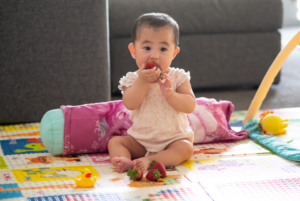Child Development, 6 months
 Watching a child grow and develop is a unique and unforgettable experience. Most children develop skills and abilities in roughly the same order, but the timeframes involved aren’t exact. Milestones are things that a child can do by a certain age. Different organizations may have slightly different ways of describing milestones. Familiarity with milestones can help shape the experiences provided to a child or alert us if there are any concerns.
Watching a child grow and develop is a unique and unforgettable experience. Most children develop skills and abilities in roughly the same order, but the timeframes involved aren’t exact. Milestones are things that a child can do by a certain age. Different organizations may have slightly different ways of describing milestones. Familiarity with milestones can help shape the experiences provided to a child or alert us if there are any concerns.
As children grow, they develop skills they different developmental areas. These include fine and gross motor, language, social-emotional and cognitive areas.
Your Developing Baby: 6 Months
- Holds head and chest up when lying on tummy by pushing with arms.
- Is learning to roll in at least one direction.
- Sits with support on the floor, turning head to look around.
- Reaches for and holds toys well.
- Passes toys from hand to hand.
- Brings toys to mouth.
- Eyes move in the same direction and watches interesting things, even from across a room.
- Looks around to see where new sounds are coming from.
- Makes sounds back when you talk.
- Makes noise to get attention.
- Cries in a different way when hungry
- Cries or becomes fussy when a toy is taken away.
- Is friendly with strangers, but sometimes shows shyness or anxiety, especially if caregiver is not present.
There are many ways you can help your child’s development.
Play is a learning experience for children. Play is a universal and vital process for the healthy development of every child. Play is the living work of children and allows an opportunity to develop and explore the world.
If you have any concerns about your child’s development, talk to your public health nurse or family doctor.
Services related to this information:
- Contact your Public Health Nurse.
- 811 HealthLine (Newfoundland & Labrador) – Call 811 or 1-888-709-2929 / TTY 1-888-709-3555

